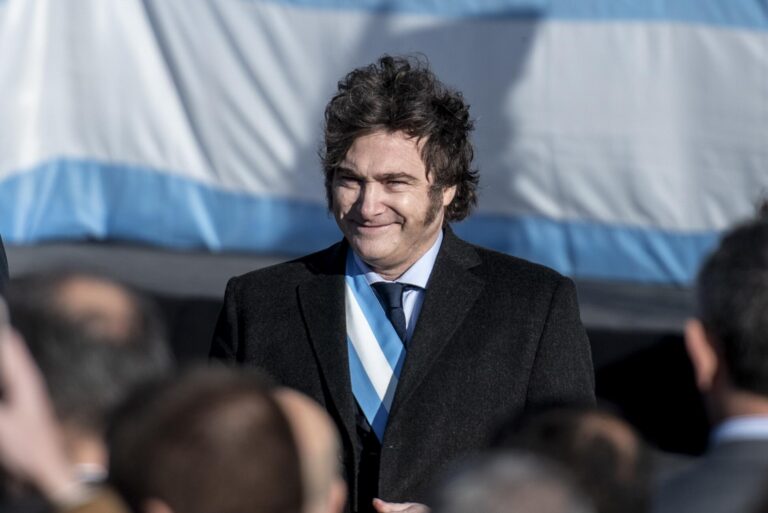Argentina’s newly elected President Javier Milei has sparked fierce debate across his country, polarizing public opinion with his unorthodox policies and fiery rhetoric. While his provocative style and libertarian agenda have deeply divided Argentines, Milei has notably gained admiration from former U.S. President Donald Trump, highlighting a complex intersection of international political alliances. This article explores the domestic challenges Milei faces at home alongside his growing influence on the global right-wing landscape.
Argentina’s President Milei Sparks Domestic Turmoil Amid Radical Reforms
President Javier Milei’s controversial push for sweeping economic reforms has provoked intense debate across Argentina’s politically fractured landscape. His efforts to radically reduce government spending, deregulate various industries, and slash taxes have been hailed by supporters as a necessary overhaul to reignite growth. However, critics argue these measures threaten social stability, pointing to rising unemployment and inflation as catalysts for nationwide protests. The president’s rhetoric, often strident and uncompromising, has deepened divisions between urban elites and working-class communities, fueling fears of long-term societal unrest.
Key elements of Milei’s reform agenda include:
- Privatization of several state-owned enterprises
- Elimination of subsidies on fuel and utilities
- Major cuts to public sector employment
- Introduction of freer market policies to attract foreign investment
| Economic Indicator | Pre-Milei (2023) | Current (2024) |
|---|---|---|
| Inflation Rate | 95% | Control efforts ongoing |
| Unemployment | 7.2% | Rising to 9.1% |
| Foreign Investment | Stable | Increasing |
Interestingly, Milei’s unorthodox political style and free-market ideology have found favor beyond Argentina’s borders, particularly earning praise from former U.S. President Donald Trump. Trump’s public endorsements underscore a shared populist approach and skepticism of traditional political establishments. This unusual international alliance contrasts starkly with the domestic fallout, highlighting the complex dynamics shaping Argentina’s future on the global stage.
Analyzing Milei’s Alignment with Trump and Its Impact on International Relations
President Javier Milei’s political trajectory has sparked a noticeable division within Argentina, as his unapologetic alignment with former U.S. President Donald Trump marks a significant shift in the country’s diplomatic posture. Milei’s embrace of Trumpian rhetoric-centered on nationalism, economic deregulation, and skepticism of global institutions-resonates with a growing segment of the Argentine electorate seeking radical change amid persistent economic turmoil. However, this alignment has alarmed traditional allies and regional partners, who view Milei’s approach as destabilizing and potentially isolating for Argentina on the international stage.
International analysts highlight several consequences emerging from this political kinship, including:
- Strained Relations with Latin American Neighbors: Milei’s rhetoric diverges from the prevalent regional focus on multilateral cooperation, raising concerns over diplomatic friction.
- Shifts in Trade and Investment Policy: Aligning with U.S. protectionist tendencies may alter Argentina’s longstanding trade agreements and foreign investment climate.
- Repercussions for Global Forums: Milei’s skeptical stance on international organizations risks sidelining Argentina in key global negotiations.
| Aspect | Potential Impact | Regional Reaction |
|---|---|---|
| Trade Policy | Increased tariffs, renegotiations | Concerned |
| Diplomatic Alliances | Closer to U.S., distancing neighbors | Wary |
| Multilateral Organizations | Reduced participation | Critical |
Strategies for Navigating Argentina’s Political Polarization in the Wake of Milei’s Victory
In the aftermath of Milei’s contentious presidential win, Argentinians are grappling with bridging the glaring political divides. Key to calming tensions lies in fostering inclusive dialogue platforms where voices from all sides can be acknowledged without rancor. Activating community forums and leveraging social media responsibly can help dissolve echo chambers, encouraging citizens to move beyond entrenched partisan views. Policymakers are urged to prioritize cooperative governance, focusing on pragmatic solutions over ideological battles to restore public trust.
Effective navigation also involves transparency and education. Governments and civil society organizations should collaborate on initiatives that demystify political processes and emphasize shared national goals. The following table summarizes pivotal approaches for stakeholders aiming to mitigate polarization:
| Approach | Target Audience | Expected Outcome |
|---|---|---|
| Facilitate Bipartisan Town Halls | Local Communities | Enhanced mutual understanding |
| Launch Civic Media Campaigns | Young Voters | Reduced misinformation |
| Strengthen Independent Institutions | National Government | Improved accountability |
- Promote empathy-driven education programs to encourage critical thinking beyond partisan lenses.
- Support grassroots reconciliation initiatives to rebuild social cohesion at the neighborhood level.
- Engage media watchdogs to maintain balanced and fact-based reporting.
Future Outlook
As Argentina grapples with the deep divisions sparked by President Milei’s polarizing rise, his unexpected appeal to figures like former U.S. President Donald Trump highlights the shifting dynamics of global populism. While supporters hail Milei as a bold disruptor of the political establishment, critics warn of the risks posed by his confrontational style and unconventional policies. The coming months will be crucial in determining whether Milei can turn his controversial momentum into effective governance, or whether his presidency will deepen the fractures within an already divided nation.




